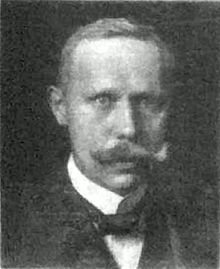Andreas Blunck
Max Andreas Blunck ( born December 20 1871 in brim, † April 12, 1933 in Aumuehle ) was a German politician of the DDP.
Life and career
Andreas Blunck was the second of eight children of a dealer in brim. He was married to Emma Reimers from Eltersdorf at brim since 1904 and had five children.
After graduating from high school in Gluckstadt studied Blunck, the Protestant faith was, from 1890 in Berlin Law and the Chinese language. His studies he earned inter alia to as auxiliary stenographer in the Reichstag and the Prussian House of Representatives. After the first legal examination and the dissertation examination in the Chinese language, he applied in April 1894 at the Foreign Office in connection with interpreting at the Imperial authorities in China.
Since he received no immediate commitment, he joined in May 1894 as a clerk in the judicial service hamburgischen one. For this he had to acquire the Hamburg citizens right to pay the Hamburg oath of citizenship for thirty marks and are Hamburgischer citizen. Then he served as a one-year volunteer at the Second Hanseatic Infantry Regiment. In December 1895, October 1897 his application in connection with interpretation remained unsuccessful.
After receiving his doctorate in Jena, he was from 1898 in Hamburg lawyer in the law firm Dr. Hermann Samson and Dr. Julius Lippmann. From 1913 to 1933 he served on the board of the H. Maihak AG in Hamburg. Early 1932 he had to give up his profession because of a stroke.
Member of Parliament
On January 1, 1900 Blunck was a member of the Eimsbütteler citizens association and soon took on the presidency of the association. In 1904 he was elected as the candidate of Eimsbütteler civil society in the Hamburg Parliament. He joined the Group of the Left. After the so-called electoral robbery of 1906, in which the electoral law was changed in the Hanseatic city in favor of the better-off, he formed together twelve other hand, the Group of the United Liberal. He was in the citizenship until 1919.
With the general election in 1912 Blunck was Member of Parliament for the constituency of Tønder Husum - eiderstedt for the Progressive People's Party. In 1918 he participated in the founding of the DDP. He was a member of the Weimar National Assembly (14th constituency: Province of Schleswig -Holstein and the Oldenburg belonging to the Principality of Lübeck). In the general election of 1920 the elections were postponed in the 14th constituency because of the set in the Versailles Peace Treaty referendum the duchy of Schleswig and therefore Blunck was with the transitional provisions of § 38 of the Reich Electoral Law of April 27, 1920 or a member of parliament until the by-election on 20 February 1921. that day was also the election of the Prussian Landtag.
His specialty was tax policy. But on immigration, he expressed in 1913 in advising the Imperial and Nationality Act in the Reichstag: " Germany is actually today rely largely on the immigration of foreign population forces, we all know from the statistics ."
Public offices
On September 8, 1913 Blunck was deployed for several months by the Foreign Office to Haiti to, represented there by an arbitral body whose chairman was appointed by the King of Belgium, the German interests in Haiti. For this he was awarded by Emperor Wilhelm II with the Order of the Crown.
After the end of the Kapp Putsch Eugen Schiffer was no longer accepted by the Left as a cabinet member because he had negotiated with the Kapp government. Following the resignation of the Cabinet Bauer Blunck was appointed on 27 March 1920 in the Cabinet Müller as Reich Minister of Justice and had to edit the criminal side of the Kapp Putsch. It was here in the National Assembly to sharp confrontations, especially with the right scientist Wilhelm Kahl of the DVP. The Cabinet Müller resigned after less than three months of government activity, as the first Reichstag elections of June 6, 1920 brought a substantial strengthening of the right.
Arrest by the Workers' and Soldiers
On December 8, 1918 Blunck was arrested by the Hamburg workers ' and soldiers on suspicion of counter-revolution and released after two days, with the support of Hermann Samson again.
Paul Frölich at the founding congress of the Communist Party on December 31, 1918: "A Dr. Blunck, a member of the Reichstag, which was involved in counter-revolutionary movements, no longer belongs to the public, and I give the insurance: If we had things in hand we would have had to decide, he would never come free again until the Revolution was assured. "
Leaflet, quoted in the article " An alleged counter-revolutionary putsch in Hamburg - arrest of members of the Reichstag Dr. Blunck and seven other suspects " in the General-Anzeiger for Hamburg -Altona from December 9, 1918
The counter-revolution is working feverishly!
A group of political adventurers has decided for the night from Sunday to Monday the arrest of the following members of the Workers 'and Soldiers' Council and other related in the foreground revolutionaries: Laufenberg, Heise, heart, Kalweit, Siemer, Ms. Halbe, Schneider, Frölich, Dittmann, Harmful, Scheible, Lamp'l, Lindau and settler.
All preparations had been made to the individual. A leaflet should be used in tremendous support. It should mislead the masses and collect the entire force of the counter-revolution. The revolutionary working class should be put down by force of arms. Misguided soldiers should be abused to the bombings. After a successful prank they wanted to use the old powers back.
The Workers' and Soldiers has immediately taken his measures. He has excavated the nest of conspirators. The tools of counter-revolutionaries are arrested. There are
Abter, editor of the Hamburg Correspondent, Friend and Wolf, former members of the press department of the Workers 'and Soldiers' Council, Zeller, a former member of the Workers 'and Soldiers' Council.
Behind them are:
Freiherr von Steineck, Lieutenant A.D., Gerstein, director of the power station Lower Elbe, Dr. Hansen, a lawyer, Dr. Blunck, former member of parliament, member of citizenship.
From the seized documents show that about half a million marks was provided for the coup.
The Workers' and Soldiers has decreed:
- The Security Service is amplified.
- The Plenum of the Workers 'and Soldiers' Council meets Monday from 9 clock in the town hall.
- At 12 clock noon convenes a combined meeting of the great workers' council ( Assembly ) and the soldiers' councils (in the 30 Committee and Assembly of Delegates Assembly of all Soldiers' Councils of Hamburg, Altona and the surrounding area ) in the great hall of the union house.
- At 11 clock assembly of all the troops on the Town Hall Square.
- In order 7/2 clock rally.










